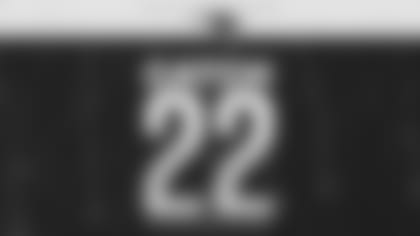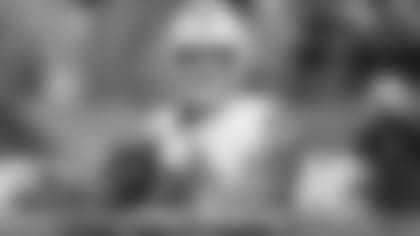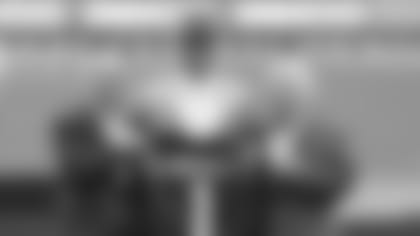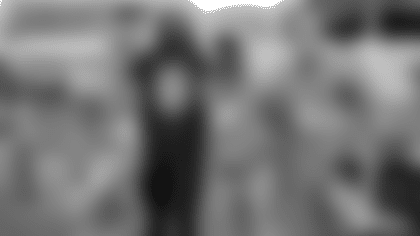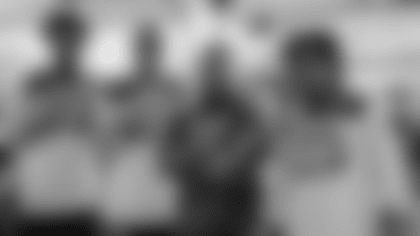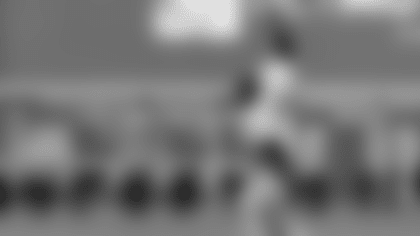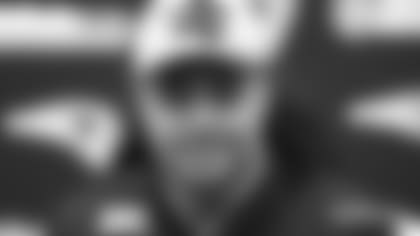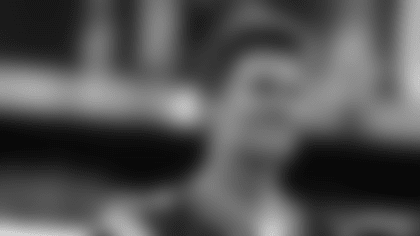BB: This morning we had a good opportunity to work outside in the rain. We worked on our footwork, our ball handling in the inclement weather and that's good. It makes it a little bit harder and forces a little bit higher level of concentration and that was good. We had three or four new people that were out there today that weren't out yesterday. I'm sure that as the days go by and the players who aren't practicing are pretty much in the day-to-day status, which is where most of them are other than a couple of the obvious ones like Steve Neal, like (Gene) Mruczkowski, that they'll be coming back hopefully on a steady flow in the next few days. And we can pretty much get up to full strength. So we had a lot of contact out there this morning. We were working on the running game. As maybe you saw, or you didn't see, but there was quite a bit of contact and that is just one of the things that we've got to go through in training camp, for players to build up the tolerance to the hitting and getting over the soreness and get through it. That's just part of the grind of camp, particularly the big guys. We had a good day on that and we've had a pretty productive morning.
BB: Any questions from you guys?
Q: How does Dan Klecko look?
BB: Dan looks like, like a lot of rookies look. (He) does some good things, trying to understand our system, especially for the linemen. With the receivers and the defensive backs you can go out there and run pass patterns and get a feel for the passing game without pads. For the linemen, we talk about responsibilities and we talk about different techniques, but until you can get your pads on and you really get the contact and the leverage and the different blocking angles at a decent tempo like we have in practice, it's just hard to simulate those in the mini-camps and the passing camps. I think for all the lineman, both the offensive lineman, the defensive lineman, the younger guys, they're getting a lot thrown at them. They are absorbing some of it, and some of it is going to take a little bit longer.
Q: How about Jarvis Green? How does he look?
BB: I think Jarvis is doing okay. I think he's doing okay. It's, again, two practices. He's ahead of the other players in there just because of his experience, and he has a little bit of familiarity with the techniques and so forth. I think it's going to take probably a couple of weeks to get enough snaps in there so that those guys get comfortable and then we can start to see how well they can really execute the things under pressure.
Q: How do you manage the coaching of that position on the day to day? Do you have the defensive line coach spending a lot of time with them? Is Romeo (Crennel) doing it? Do you go over some points from the day before, take Jarvis and Dan, for instance, aside and say, 'Here's some of the things we want to practice'?
BB: After each practice there's a meeting. That's really one of the reasons why we changed the sequence of training camp. As opposed to having a morning practice, an afternoon practice and a night meeting, now the way it is sequenced, after every practice there's a meeting. So, this morning we practiced, we'll meet this afternoon...
Q: Coaches or...
BB: And players. And then we'll go out at 6 o'clock tonight or whatever time it is. So in that afternoon meeting, we'll watch the film from the morning and we'll talk about the things we are going to put in the afternoon. That way after each practice we can go to the film and show the players the corrections and the techniques and what was good and what wasn't good, before we move into the next phase. As opposed to when you do it morning and afternoon, and then come in at night: number one, you don't always get to all the film because it kind of back logs on you; and number two, that teaching at the end of the day after two long practices is probably not the optimum learning environment. Exactly what you are saying, is what we do. We go out there, we practice it, come back in, correct it on the film, go over it on the board, install what we are going to do the next day, and repeat that same process.
Q: Are the coaches watching it right now? And then they'll watch it again with the players?
BB: We'll watch it before the players do. We'll run through it before the players and talk about it. Sometimes little things come up that we have to make adjustments on so that we are all telling the players the same thing. Then when the players come in, I think it's 3 o'clock, special teams a little bit earlier than that, but then when we get to offense and defense at 3 o'clock then we go through it with them.
Q: Would you prefer to establish one nose tackle? Or are you going to rotate it?
BB: Well right now, Ty (Warren) and Richard (Seymour) are working at end. It could turn out that way and if one of those guys turns out to be the next Randy White I'm sure he'll be playing most of the time. We'll just have to see how that goes, but we have that rotation there and some other positions, inside linebacker, outside linebacker. So if it turns out that way, that could be okay, or if one guy is really able to establish himself above everyone else, then that player will get the majority of the time.
Q: Switching to the safeties for a second, there are team drills, a particular play where Rodney (Harrison) crept up to the line and then went back to his position. Is there a way schematically where you can disguise it to where Rodney, or even Lawyer (Milloy), can still be close to the line of scrimmage helping run support yet play a split safety type of coverage that you like to play a lot?
BB: Yeah. You can play them in varying degrees of depth. Right. Whether you want them back there as a deep zone player where really everything is in front of them or where you bring them down tighter and sometimes give them tighter responsibilities such as covering the tight end man to man or playing in a shorter zone. So there is a number of different ways you can do it. In our system, I would say we probably have most of them, or certainly in a combination somehow. And that's part of it. Sometimes they are up. Sometimes they are back. We install everything now to get it in, so we know how to do it and as we get into specific games then we will try to select the ones that we think are most appropriate for that situation. But we want to get it installed, get it practiced now, so that we are not trying to teach it at a later point in time.
Q: Are their coverage skills underrated? Or are they box safeties?
BB: I think that term is probably a little overused.
Q: Box safety?
BB: Right. Defensive football players all need to be able to do certain things, and if you can't do them it is hard to last out there very long other than corners. You have to be able to take on blockers. You have to be able to diagnose plays. You have to be able to tackle in close corners. You have to be able to tackle in the open field. You have to be able to play zone. You have to be able to play some man. No matter what the defense is, somebody has to do some of that or I don't know how else you can do it. I think they both have a good set of skills and at this point we are just really trying to do a lot of teamwork, to help everybody with their recognition and their assignments and make sure everybody really knows how it should be played on a contact level, where you can get the physical part of the game that we couldn't get in the other camps. And at the same time try to work on our fundamental techniques, so individually our footwork, our ball handing, catching skills, throwing skills, hand use and pass protection and all those kind of things, that they are being refined as well. So those are the objectives of these early practices.
Q: Have you ever coached a tandem, considering their accomplishments and their abilities, quite like this one?
BB: Yeah, they both have real good resumes. There is no doubt about that, they have good resumes. You know, in Cleveland we had Eric Turner and Steve Armoure. Those are two good safeties, were two good safeties. In Denver, we had Billy Thompson and Steve Foley, two pretty good safeties. But I think in terms of resumes, you could put Rodney and Lawyer up there, probably with anybody.
Q: Can you compare their styles of play?
BB: Well, let's wait until Rodney plays in our system. I think sometimes it's tough when you compare a player in one system with a player in another system. How much of it is the actual style of the player and how much of it is what the system is asking them to do. I think when you get both players in the same system then it is a little easier to differentiate, when they are both pretty much trying to play pretty much the same thing, how one guy is effective versus another guy. I think there are a lot of similarities; I'll put it that way.
Q: Can you talk a little bit about Don Davis? What are your expectations as a linebacker? As a specialist?
BB: Don is a player that we talked to, one, two, this is our third time really of talking to Don Davis when he's been available in free agency. The first year he stayed at Tampa, then the next year he went to St. Louis, and of course this year he came here. Don is a very intelligent player. He runs well. He's athletic. He's very good in the kicking game. And he gives you a lot of range at the linebacker position, and in our system he's playing inside. I think he'll give us good competition and good depth at that spot. I think that what he's trying to do and what we're looking for is his ability to establish a role for himself in our defensive packages. Whether that does or doesn't materialize, we won't know until it runs it's course but I certainly think that's a possibility.
Q: Is that going to be an adjustment for him not having played a 3-4 and being in the league for 8 years now? He's in the middle in a 3-4 now for the first time, in your experience, is there a big learning curve there?
BB: Well, I think there is a learning curve. I don't think there is any question about that. But again, Don's a smart player. He's instinctive. He's played in the league. We're not talking about a guy who hasn't done that. He's played with and behind some very good people. He's also started and played at a pretty good level. Sure it's an adjustment, but I think it's one that he's capable of making. From what I have seen to this point, and it's been limited naturally, but I think he's done a good job with it. He doesn't have a lot of mistakes. There is always some things you can do a little bit better and some techniques to refine. But he doesn't make many mistakes out there.
Q: Talk about the decision to move Roman Phifer inside for linebacker?
BB: A lot of Roman's play has come as an off-the-line linebacker. Not to get too technical, but for the most part you see linebackers play off the line of scrimmage or on the line of scrimmage. Occasionally you see some players do both, but I would say that there is less of that then guys who are pretty much on the line most of the snaps or they are off the line most of the snaps. And Roman is a versatile player, one of our most versatile players. He has done both, but he has played off the line of scrimmage, I would say probably more in his career than he has played on it. So being an off-the-line linebacker in a 4-3 defense, usually he would line up somewhere between the tackle and the guard. In a 3-4 defense, he's going to end up lining up for the most part between the guard and the tackle. There are some differences; I'm not saying there aren't. But in terms of...
Q: Is there less covering?
BB: No. I think that a lot of his responsibilities are similar to the ones that he's had before. They aren't exactly the same, but they're similar. And he would just at this point, probably be playing a little bit less on the line than he did last year. But we know he has some ability to do that. And we may call on that at some point in some of our different defenses as they come up. But I think overall, you'll see him less on the line, maybe than you did last year.
Q: Even with Ted Johnson and and Roman (Phifer) working with the first unit right now, and Tedy (Bruschi) is next up...
BB: Well first of all, I wouldn't make too much of this first team, second team at this point. I think we are going to have a lot of defensive players who are going to play quite a few snaps for us on defense. Who's in there the first play of the game or who plays the most or all that could vary. But you are going to see a lot of Bruschi, you are going to see a lot of Phifer, you are going to see a lot of Ted Johnson, they are all going to be out there.
Q: So that would be a rotation?
BB: Or depending on the...maybe not every defense is going to be a 3-4 defense. We'll definitely run some four-man line, and that may change some adjustments in how we deploy the people. We are just going to have to see how that works out.
Q: Similar to 2001 when you had Bryan Cox, (Ted) Johnson and (Tedy) Bruschi?
BB: Yeah, well in that season we started off in primarily a 4-3 defense. Ted and Bryan got hurt within about a week of each other, if I remember correctly. Then Tedy became our full time mike and we converted almost exclusively to a 4-3 defense, due to that fact that we started off with three linebackers and ended up with one true mike.
Q: One year ago, the number one issue this team had was the run defense and that was something you have to fix.
BB: It's a priority.
Q: How has that been addressed so far heading in to camp?
BB: I think it's been addressed in the usual ways. As a coaching staff, we've broken it down and tried to take a look at what the problems were and how to correct them. Schematically, we've made some adjustments in our system and then as the players have come in in the offseason program, we started to employ those changes and teach them, whether it be alignments or techniques or whatever. In some cases we have new players involved in those positions relative last year. I think a combination of all those things, or what we've done to this point, and now how all that manifests moving forward, is now really a work-in-progress. As much time as we put into it in the offseason, it's really hard to work defensively on the running game until you can get into pads and work the running games in pads. Not that you can't learn not in pads, but you've got to do it at a contact level to really get an understanding and be good at it. And that's what training camp is for.
Q: Among things, was that the most disappointing aspect of last year?
BB: Yeah. I mean, I don't want to rank them. But it was...it certainly wasn't any highlight for us. It would certainly be up there.
Q: Rosevelt Colvin is thought more of as a pass rusher than a run defender. How do you feel about his run defense skill?
BB: I think it has been good so far. I think Rosie has a good set of skills to play the position and do the things that we are asking him to do. He works hard at it. He takes a lot of pride in every aspect of his job. And I think he'll be okay in his run defense for us.
Q: On Rodney as it relates to run defense, do you want him as close to the line as you can?
BB: What you would really like to do is to be able to stop the run without using your secondary. That's the optimum situation. If you can get your front seven to handle the running game on a consistent basis, then it really gives you four people to play coverage with.
Q: Is it just because he has been so good at it in the past?
BB: Well, he will certainly be up there. He will have opportunities to do it and then there will be other times that will be a secondary responsibility for him. In overall terms, defensively, if you can handle the running game without your secondary you gain a big advantage defensively. Whereas if you have to commit one of your secondary into the running game, then you have less to defend with in the passing game and sooner or later that is going to catch up to you.
Q: What is it about Rodney that convinced you he could work with your system?
BB: Well, my first exposure to Rodney was in the Pro Bowl in 1998 and I coached that. I had a good week with him out there. I know it's the Pro Bowl, but you still get a feel for working with a player. I saw him coming out of college and followed his career and watched him as a player and we tried to evaluate him. I think he has got a lot of talent and he's got a lot of strengths in his game. He is a tough, physical contact player that's been durable and has made a lot of big plays in his career and he has made plays in the passing game as well as the running game. Given our situation at this particular point and time when he became available, we just felt like it was a way to improve our football team and that is how it came about.
Q: Were you attracted to his intangibles as much as perhaps his talent as far as an intimidation factor and his strength factor? He kind of sets the tone and really has a physical presence back there.
BB: He is a very physical player. I don't think there is any question about that. He's got a strong physical game. (If) used properly, that could be a huge asset particularly in terms of controlling the middle of the field.
Q: Are you looking for an emotional leader on defense?
BB: I think our leadership on defense was good last year. I think it will be continue to be good. We had three defensive captains last year with Milloy, (Tedy) Bruschi and (Anthony) Pleasant. I think they did a good job. I don't think that was the problem. We didn't play particularly well defensively, but I don't think it was because of a lack of leadership.
Q: What are you looking for from Ken Walter in the punting game this season?
BB: Well, I think we need to improve our punting game at every aspect. We had a punt blocked last year. We had a couple of other ones that really should have been blocked. Our overall net punting wasn't as good as we would have liked for it to be, which includes our plus 50 punting which a lot of times people forget about that. Those are important field position plays, some of that is the punter, some of it is the people downing the ball. So, our overall performance of our punt team including the punter but including everybody else is one of our areas that we want to upgrade from what the performance was last year. Two years ago, that was one the strongest areas of our team both statistically and on a performance basis. Last year it wasn't. That is certainly something that we want to try to improve. The punter's job is to execute the particular punt, and there are a lot of different things that come up, in the particular situation that is involved with it. The hang time and distance, whether it be hang time or ball placement on a plus 50 punt or wait from return tendency to those kind of things. So, there are a number of things involved and in total we are looking to improve the overall performance of that group, there's no question.
Q: You seem to be stock piled on the punt return and kickoff return department. Do you feel that you have as good a competition at that position as you have seen?
BB: I think our competition is good. We'll see how that goes. Again, I think we're going to have to make some decisions along the line here on how much we want certain players to do and how we want to spread the jobs out between offense, we have some defensive players who are going to be a factor in the return game too, but just on the offensive side of the ball, how much of their responsibilities are going to be in the return game versus on the offensive side of the ball and how effective they will be. We will just have to see how that plays out. We have a number of guys who have produced in this league and some other guys who have some talent that look like they can challenge, so it's a good situation.
Q: Have any of the rookies caught your eye?
BB: Well, in college Eugene Wilson, Asante Samuel, and Bethel Johnson all had some production returning. So, we will certainly give them an opportunity to demonstrate what they can do and we will just have to evaluate it. At this point, they all need to work in those areas. I don't think that they had the experience and the overall skill that our veterans do at that spot, but that's not to say they couldn't gain that and I do think they will be competitive for those positions.
Q: Is it your hope to replace Troy Brown on punt returns?
BB: No, not necessarily. But, we want to get the best players out there and be productive in that phase of the game. I don't really care who returns punt.
Q: Just so there is less wear and tear on him.
BB: Well, I think in the end we are going to have to make a decision on that, yes, as to how much we want, whoever it is, to do in terms of punt returns, kickoff returns and the number of plays they have on offense and does one take away from the effectives of the other. Sometimes we may feel it would and sometimes we might feel it wouldn't. I'm not sure on that one. In terms of personal preference, I don't care who returns punts. I don't care if (Mike) Compton returns them. If we are productive running them, I'll be happy with that.
Q: Is he going to take some snaps there?
BB: After he gets through with snapping them, we'll send him back there.
Q: Have all the players who took and did not pass the conditioning test, now re-taken it and passed it?
BB: The players who are not practicing, for the most part, other than the one's I have mentioned and I mentioned a couple, are in a day-to-day type situation. It could be for a variety of things. As we determine that those players are physically, and in some cases mentally, ready to go out on to the practice field and perform, then we will put them out there. That's the best way I can answer that question. I know that's not really what you're looking for and I know there is a story out there. I hope you understand, but I just am not going to get into a blow-by-blow evaluation of each player on every little specific thing they do.
Q: Let just say a player has a twisted ankle and we don't know that and we're reporting that he showed up out of shape and failed his conditioning run. Maybe it was because he was hurt. Are we doing that with any of these guys?
BB: Yeah, sure. I would say so.
Q: Then why...
BB: I mean, I'm not telling you how to write the stories. That's your job. I'm telling you what the status of the players are. (Gene) Mruczkowski and Steve Neal, you can forget about seeing them participate in pads for a while. They are going to be a while. Other players are within one day, two days, three days, a week, I'm not sure exactly but they are getting treatment or they are doing what they need to do to get themselves physically ready to go out on the field and perform. Once they are ready, we will put them out there. As a coach, it's my responsibility to the team, and it's my responsibility to those individual players, not to put them out there until I'm convinced, and of course I rely on the rest of our staff on that too in that area, the doctors, trainers and the other position coaches and strength coaches to evaluate when they are ready. When they are ready, then will put them out there and let them compete. If they are not ready, for whatever the reasons, then they are not going to be out there.
Q: You may be reluctant to get into specifics in this regard, but what did you mean by mentally? Are you talking about with regards to out with injury or not hitting the playbook?
BB: No, I am not talking about the playbook. I am talking about a player has to have enough confidence he can go in and do a medical test, whatever it is, and do enough weight on a leg test or what the doctor examines and says, 'Okay, your leg is strong enough,' or 'Your shoulder is strong enough, you can go out and play.' But the player also needs to have enough confidence to be able to feel like 'I can go out there and do what I need to do without every step of the way thinking about, 'well I can't hit with this shoulder or I can't cut off of this foot,' and that kind of thing. There's a process that you have to go through sometimes when a player is coming back from an injury where yeah, it looks like he's strong enough but he hasn't had the confidence to do the things that he's going to need to do in a reactionary situation on the field, you don't know when you are going to have to cut this way, you don't know when you are going to have to hit somebody with that arm. So, we try to put them through situations so that they can build the confidence with it, whether it's in sleds or whether it's reacting to different movements from the trainers and the coaches and preparing the player to come back on the field. Each case is a little bit different. It could be basically the same injury but for whatever reason one comes along a little quicker than another. Maybe the injuries are similar but they're not the same, there are a thousand scenarios. But, the bottom line is, when the player is ready, that's when he goes back out on the field.
Q: There are coaches in a number of sports who would come right out and say 'this guy, this guy and this guy didn't pass our conditioning test,' and open them up to some kind of public flogging. Philosophically, since you've been here you seem opposed to doing that. Why is that? Is there no upside in that?
BB: Well, the bottom line for me is to win football games and put a good football team on the field. That's the bottom line. There are some players that probably go out there and set an Olympic record running that conditioning test or some other conditioning test, whether it's a twelve-minute run or whatever it is, that aren't good football players. If a guy isn't a good football player or if he can't help your team, it really doesn't matter what he can do in some other measurement that you do with your team for the sake of measuring progress and keeping track of physical status of your players. On the other hand, there are players who don't do well in some of those things that are good football players. The bottom line is, for a player to go out on the field he has to be able to do what he needs to do. He's got to be able to defend himself. He's got to be able to run. Whatever his skills are, if he is a quarterback he's got to be able to throw. Whatever his skills are, he's got to be able to do them. If he can do them, he deserves a chance to be on the field. If he can't, then I can't put him out there. I know it's general and each case is a little bit different but going through the specifics of each case is just too hard and I think it's too misleading.
Q: Do you think that's unfair?
BB: I didn't say that.
Q: Is that the reason you won't tell us why a guy didn't pass because it singles out guys?
BB: Just look at it this way, if they are out on the field practicing we feel comfortable that they can go out on the field and do what they need to do. If they are not out on the field practicing, then there is still something that isn't quite right with the player. That's not saying he's never going to play again, it's not saying that he's a bad human being, it's just saying that he's not ready to go out and do what all the other players are doing. So we do it at a modified rate or pace so that he can get to that point. That's all we care about. That's what his responsibility is to work hard so that he can get to the point where he can mainstream and do what all the other players are doing. I guarantee you there are some players that work twice as hard as the guys who are out there going through a practice to try to get to the point so they can do that. I have all the respect in the world for those players. I don't in anyway mean to demean them or make it sound like they're doing anything less than every single thing they can do to be out there. So I can't ask them to do any more than that.
Q: Is it fair to say that the guys who aren't practicing injured or are they just fat guys who can't run?
BB: I think you answered your own question. You evaluate the players. If you think they are fat and can't run, then that's... I don't think Otis Smith is fat.
Q: Is it unrealistic for fans to think that Jarvis Green and Dan Klecko, either one of them or both of them, are going to play primary roles starting in September for the Patriots?
BB: I think that is almost an impossible question to answer, but let me try to put it to you this way. We have 85 players on our roster; the 80 that count and the five from Europe that don't, so there's 85 people. All of those players we think have potentially have the ability and the skill set and the talent to be able to play for our football team. If we didn't feel that way, then we would have somebody else in those spots. At this point, some are ahead of others. But in time and that is what training camp is for, and with opportunity and experience that may change. How a player is going to progress and where he is going to be and what he is going to do, I don't know. Again, if you had asked me in 2000 whether Tom Brady would have any affect on the team in 2001, none of us would have said that. If you had asked who the starting guard would have been in 2001 and 2000 and Joe Andruzzi wasn't even on the team and ends up playing as much as he played in the 2000 season, we wouldn't even had mentioned Andruzzi's name. I mean, he was a guy who came in off waivers and played a significant part and role on the team. There may be a Joe Andruzzi out there that comes in and impacts this team this year. I don't know. That's a hard question to answer. Is it unrealistic? With the players out there practicing and participating on our team and we're working with him and he's getting better, he could eventually establish a role for himself. If he is not here and he's is doing something somewhere else, then there is always a possibility that the player could surface here or in some other system and end up being a productive player. There are hundreds of examples of that, Andruzzi is just one for us. You can look at that every year. Somebody doesn't do anything for one team and then goes with another team and plays well. It's a tough question to answer. That is what training camp is for.




